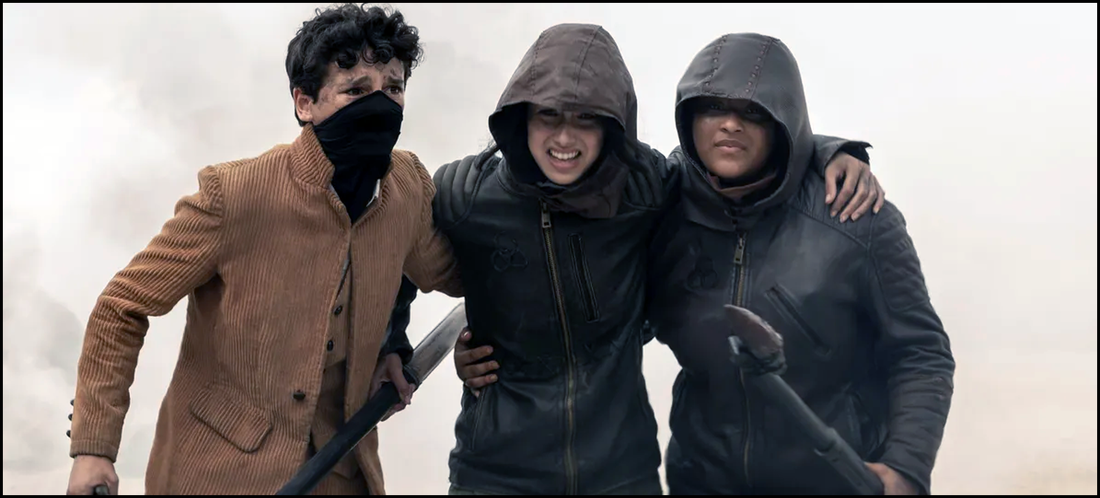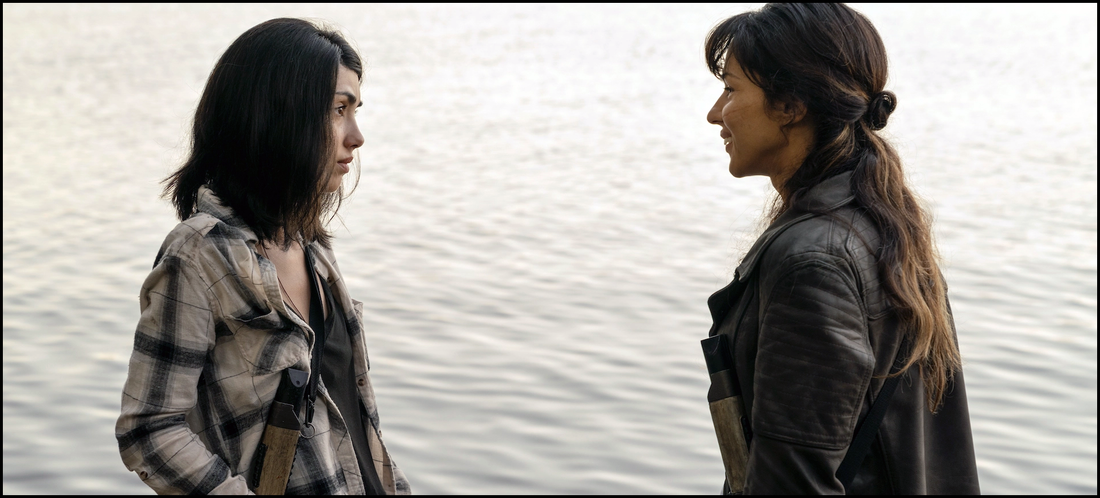AMC’s The Walking Dead – a TV-based adaptation of the popular comic from Robert Kirkman and friends – premiered in 2010. Despite exploring some incredibly downbeat subject matter (namely the end of life as we know it), the series rocketed to the top of the Nielsen ratings, perhaps defying expectations of Hollywood’s established prognosticators. Naturally, network executives were enthusiastic about ponying up as much Dead as they could; so they tasked the program’s creative powers with designing a kinda/sorta sister series, something that could fill the void left when The Walking Dead was on its regular production breaks. The result – Fear The Walking Dead – promised to explore the origins of the virus, but rather quickly turned into just another venue for telling stories audiences had seen before on the original. When it appeared to be losing some of its luster, Fear’s showrunners even took the avenue of robbing one of The Walking Dead’s popular characters (Morgan, played by Lennie James) from that hour and giving him top-billing in theirs. If that doesn’t smack of desperation in a universe requiring desperation throughout its narrative, then I don’t know what does.
And yet, AMC still wasn’t content.
Despite both program’s lagging viewership and the loss of market share, executives continue to press for Sheriff Rick Grimes to return to The Walking Dead universe by way of a trilogy of motion pictures. (For those unaware, this central character also vanished from the TV show, but unlike Morgan his departure was under curiously suspicious circumstances, ones intended to set-up the movie franchise.) At last word, the proposed trilogy was heavily mired in pre-production efforts “to get it right,” perhaps the only studio acknowledgement that – as Trek producer Berman cautioned – going back to the well is risky business. I suspect that these big budget extravaganzas will cement the franchise as either blockbuster gold or prove that perhaps the Dead could use a bit of retirement for the time being.
Still, AMC wasn’t content to rest of the laurels of the deceased, and somehow The Walking Dead: World Beyond came into being. Again, it was reported that this show would be different from what came before because its cast of characters were going to be youngsters who’ve only known the world of the Apocalypse. There were some additional promises made about how World Beyond would serve as a bridge between the TV universe and the forthcoming movies; but most of those sentiments have vanished from online chatter surrounding the show.
In a recent interview with Nico Tortorella who plays Felix Carlucci – a troubled gay survivor tasked with protecting the youth in World Beyond – the actor implied that Season Two of his program will be markedly different than Season One (which SciFiHistory.Net reviewed on DVD right here). Boiling down what he said to the core point, Tortorella claims that the first ten episodes were designed to lay out the background of these newcomers to the Dead universe so that now the real story can begin.
For what it’s worth, that’s a sentiment I hope is true.
Unfortunately, this binding tenet even extends into the show’s secondary entries: Felix, Huck, and Percy are also plagued by some of TV’s worst parents! As the show tore through its first season, I couldn’t help but wonder how many of its screenwriters had undergone family counseling over the years. What truly hurts about this discovery is that, unlike the four leads, these supporting players are actually more interesting creations, the kind of characters an audience might inevitably root for … but is this show’s core mythology meant to explore the Dead universe or just preach about how all adults are bad?
To the show’s credit, World Beyond has – in a sense – let these kids be kids.
Though they’ve been taught what to do when coming face-to-face with an approaching zombie, they’re all still hesitant about taking a life, even a life that’s already forfeit (like said zombies). Not a one of them genuinely wants to kill one of the ‘empties’ (this show’s preferred term of the walkers), and the fact that that particular wholesomeness still survives the Apocalypse gives me hope that perhaps a future generation might truly be able to rebuild what’s been torn down with mankind’s collapse. I won’t say that it hasn’t been frustrating in some instances because it has; I’ve had to bite my tongue for lashing out when these kids just stand there and let the threat get closer. But I get it. They’re kids. Maybe AMC took a long, hard, legal look at depicting kids constantly going for the kill shot or they insisted on kids being kids; whatever the case, I made my peace with it. It was still occasionally off-putting.
Also particularly troubling for me is the casting of Annet Mahendru: she plays the tough-as-nails former Marine ‘Huck’ whose background does involve more than a fair bit of subterfuge. (I won’t spoil it, but I will encourage viewers to watch closely as much of the season’s better moments revolve around her, her choices, and her mission.) Mahendru first dropped onto my radar with her work in FX’s excellent spy drama The Americans (2013-2016) where she played a Russian spy with ever-changing loyalties. Here, while balancing similar characteristics, she’s also supposed to be cocky, brash, and irreverent … yet, apologies, but it just isn’t working. All of those moments come across as scripted – performed by an actor in a part. While some of this may be by design (again, I won’t spoil it, dammit!), it just all feels fake. Shackling a character with far too many levels of deception with an ensemble of wholesome youngsters is a huge narrative mistake, one that might be too big to overcome. It worked for The Americans, where her performance was even greeted with award nominations but also surrounded by a cast of characters equally conniving and duplicitous. Here? In The Walking Dead universe? It feels like artifice.
There are always ways to fix things that are broken, so there’s a chance that The Walking Dead: World Beyond’s creative powers that be can salvage something so woefully conceived and executed with whatever remains of its second season. However, given that the entire first season was kinda/sorta wasted on a ‘gotcha’ road-trip set-up, I think the question remains: “Do they even want to fix it?” It’s only a two-season commitment, so maybe they’re all going to remain attached to whatever end game they plotted out from the beginning … which may or may not be better than what they’ve delivered thus far.
-- EZ



 RSS Feed
RSS Feed